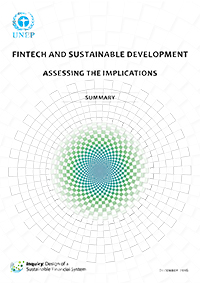
14 December 2016
Technological innovation is disrupting every aspect of today’s financial system, but it could also break new ground in the world’s transformation toward sustainable development according to a new report from UN Environment’s Inquiry, “Fintech and Sustainable Development: Assessing the Implications”.
Financial technology, known as ‘fintech’ – including innovations such as mobile payment platforms, high-frequency trading, crowdfunding, virtual currencies, and blockchain – threaten the viability of today’s financial sector business models, and the policies and regulations that have shaped modern finance. But in combination, these innovations – given the speed, breadth and depth of their disruptive impact – could also be harnessed to better align financing with sustainable development.
Turmoil and transition guarantee that tomorrow’s financial system will be very different, and fintech innovations are putting finance at the core of an increasingly automated global economy with seamless two-way communication. This greater decentralization for financial transactions could in turn help increase the provision of finance for sustainable development, the report finds.
The report is a companion to the second edition of “The Financial System We Need” by UN Environment’s Financial Inquiry, and to which UNEP Finance Initiative contributed, and assesses how the financial system’s core functions are likely to be disrupted by fintech innovations and how they could help – or hinder – efforts to align financing with sustainable development. The report considers ways to:
- Unlock greater financial inclusion by reducing the costs for payments and providing better access to capital domestically and internationally;
- Mobilize domestic savings at a scale that will enable long-term investment directed at the long-term sustainability of the real economy;
- Disrupt the provision of financial protection, risk management, risk transfer and risk diversification for vulnerable and exposed communities, real economy assets and infrastructures, and nature’s ecosystems;
- Collect, analyze and distribute information on the financial system and the real economy for better economic decision-making, regulation and risk management;
- Provide financial markets with the level playing field and market integrity needed for long-term real economy investments aligned with the sustainable development agenda.
Read a summary of the report here, and download the full report here.


